'Don't take away our healthcare' says Trump country
- Published
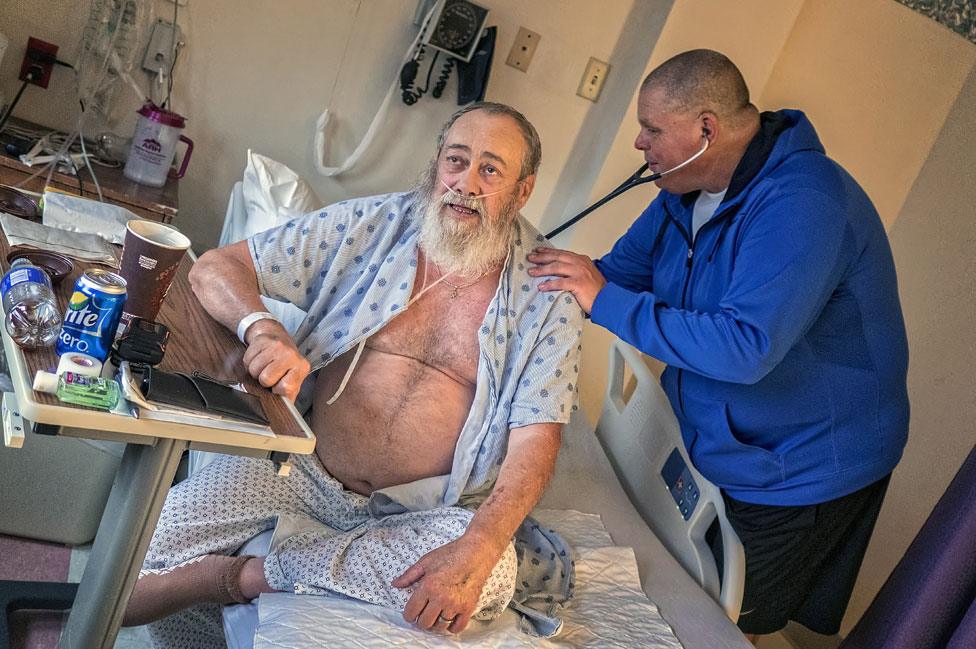
Dr Breeding works 16 hours a day
The Central Appalachian mountain ranges in Kentucky are home to some of the poorest - and most fervent - Trump supporters. But what happens in the next few weeks hundreds of miles away in Washington could shape their future.
Dr Van Breeding is tireless and determined. He has been up since four and it's now late in the afternoon.
He still has a roomful of patients to see, a late night clinic to run, and several medical students to mentor, but he simply smiles.
"This is why I became a doctor. I have to be an advocate for my patients. My heart is in these hills and with these people, " he says.
The 55-year-old with the frame of a boxer is fighting a war and right now he's not sure if politicians stand ready to help him or hinder him.
Every day he is on the front line in the battle against a rising number of patients suffering from ill health and the opioid epidemic sweeping his home state of Kentucky. His endeavour, and skill, have won him the title of Country Doctor of the Year.
He never stops. His staff wonder if there could actually be two of him. They complain about the steady stream of text messages they get before sunrise. To talk to him they hover in the clinic corridors to try to catch him as he rushes from room to room.
But they also know why he's so driven. This area has rates of cancer, heart disease, diabetes and obesity that are among the worst in the US.
Dr Breeding fears Washington is so busy looking at the politics of healthcare provision that they've forgotten about the kinds of problems he has to deal with daily.
"There shouldn't be any sides. There are no sides to this. The only side is great health care for every American."
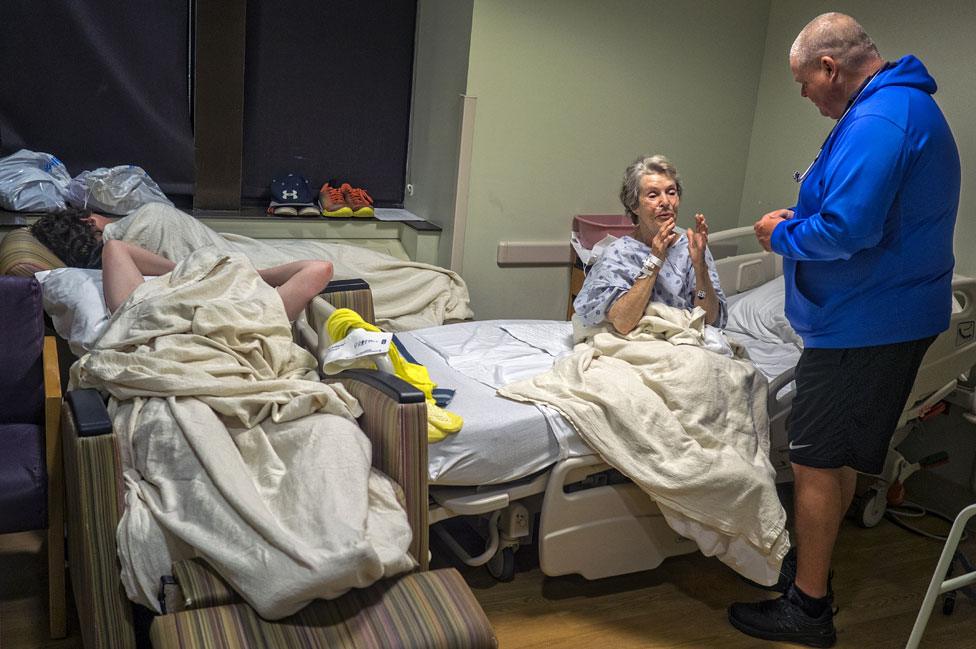
He believes that they should be looking at the kind of healthcare models used in the UK and France.
"Other countries have done it. They've set the groundwork for us. We can take what they've done and use it and build on it to make it the best programme in the world.
"That's why the United States is as strong as it is. We've always taken things and made them better. Why can't we take a healthcare product and make it better instead of fighting over it."
Dr Breeding was born and bred in Whitesburg in Letcher County. Most of his school friends used to work in mining. There was good money to be made at the coal face. The odd truck still kicks up dust over the highway making its way from one of the few mines still open.
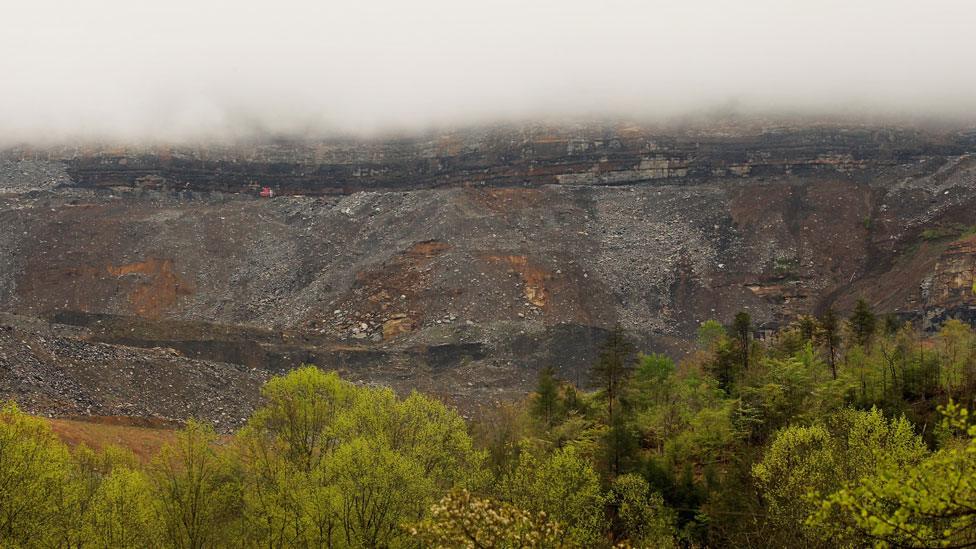
Coal mining has left its scars on the mountains
But most are derelict and there are not many other options in the Appalachian mountains. If you ask who's to blame, people give you one name.
Barack Obama.
The former president's climate change agenda may not have been popular here but his health reforms have had a real impact.
The new buildings in this town belong to the health centres and almost half of Dr Breeding's patients have their costs covered by Medicaid, a government programme for the poor which was expanded during the Obama administration.
It means that a trip to the doctor won't cost them their rent, or their weekly food shop.
'Trump not thinking about the little people'
Claude Lucas says Medicaid has saved his life. It has paid for the medication which keeps him alive. He has black lung disease after inhaling coal dust for 27 years.
When the mine closed, he lost his job and his health insurance. He coughs as Dr Breeding examines his laboured breathing. He is 51 years old and his life is now limited. He is unable to work and without Medicaid he might not be here at all as he could not afford the kind of treatment he needs.
Kentucky put their faith in the new president because of his pledge to re-open the coal mines. In Letcher County, 80% of voters chose Donald Trump. They also believed his promise that Medicaid would be preserved. But Republicans are considering drastic cuts to the programme.
That has made Catherine Collins angry. She is paralysed and in a wheel chair after a car accident 12 years ago. She is determined to try to walk again, but to do that she needs regular physical therapy. Again, her costs are covered by Medicaid.
"I think Donald Trump is just taking into consideration his concerns and he's not thinking about the little people. I don't know what he's thinking. He promised a lot to get in the office. And he's went back on a lot. Big words were spoken. A lot of lies were told by him."
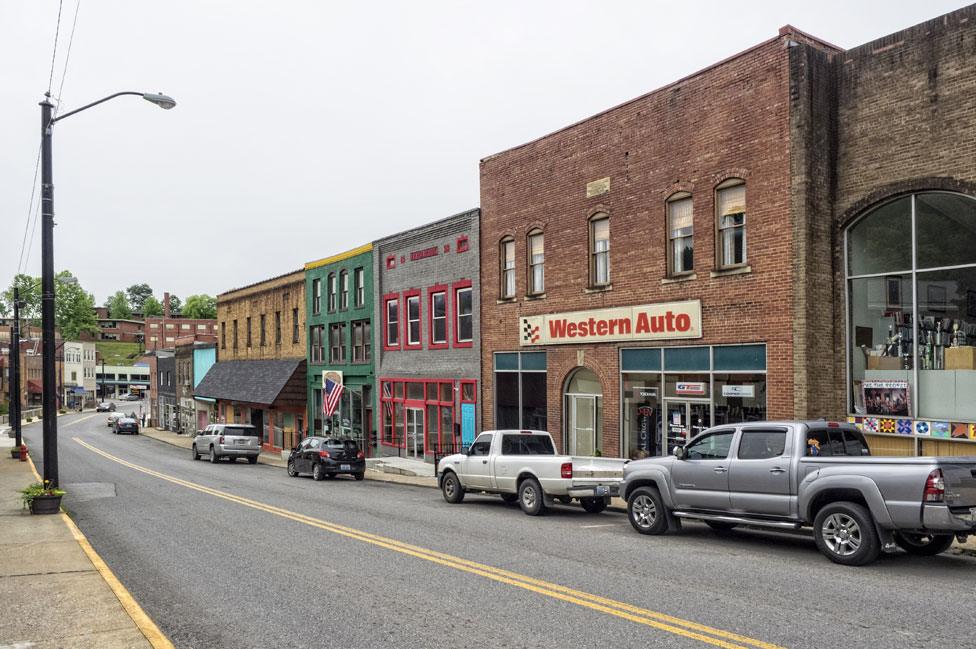
Whitesburg in Letcher County, which has some of the worst health indicators in the US
But there is a larger question. Who should pay to help those who can't?
Insurance premiums have soared as companies try to recoup costs.
Matthew Caudill keeps himself healthy and works hard. He believes the President Obama's Affordable Care Act has been a real mess for him and his family. He used to pay $43 (£33) a month for coverage for himself and his two children - he now pays $400 a month and he says his deductibles are so high he may never get to use the benefits.
"It has devastated my family's coverage. I find myself unable to feel sorry for anybody else when my children's coverage is so poor. I must worry about my family first. If nothing changes then this will get much worse in the coming years."
The future generations of Letcher County are in peril and decisions taken 500 miles away in Washington could have a profound impact. One of the most controversial is how to fund treatment for the opioid addiction which touches nearly every household here?
Cortney Akeman is four months pregnant and is slowly being weaned off various drugs including Fentanyl. Her first son Mason was born shaking and turned blue because she couldn't quit. This time she's determined to do better.
"There are a lot of pregnant women affected by drug use, but most of them are receiving help now. Without it you'd watch this place go down bad."
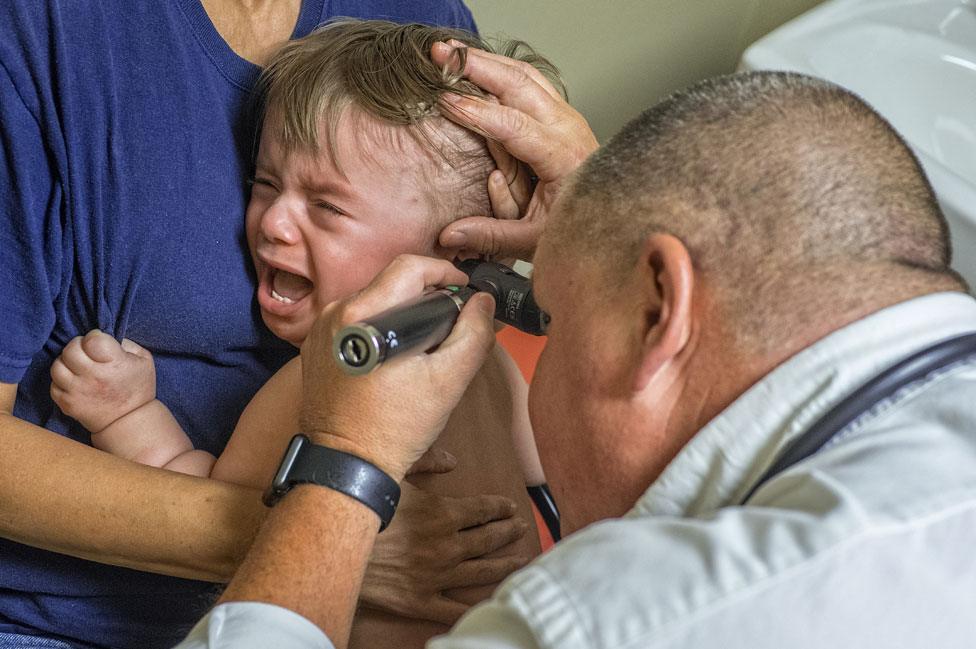
Dr Breeding's Mountain Comprehensive Care Centre runs a programme to try to help pregnant women before they give birth to a drug addicted baby. Patients don't have to pay for it as it is covered by Medicaid, but that is being reconsidered in the latest draft of the health bill.
Cortney is cleaning up a trailer for her new family to live in, and she's hoping to go back to school once she is drug free.
"I'm a little bit nervous. I always will be I guess. I will always have that fear of getting back on drugs but I'm excited. More excited than nervous because I can't wait to just be back normal."
She laughs. "I know that probably sounds crazy to say that but I just can't wait to have my life back together and focus on other things than getting that feeling every day."
Dr Breeding believes this type of preventative medicine will save money in the long run and it should help break the cycle of abuse. But he is also a pragmatist. He knows that federal funds can't keep flowing to Letcher County.
"I think we all should have the same insurance. If we said that from President Trump down to me and any of my patients that we all had the same insurance I think we would all be bought into making sure that it worked right for everyone."
The cry I heard over and over from Letcher County was the same. Don't take away our health care.
Donald Trump described his voters as the forgotten of America.
People here are hoping that he will not turn his back on them now.
Follow Laura @BBCLBicker, external

More on the healthcare debate
Trump's battles with Obamacare - in his own words